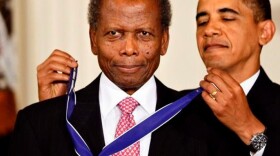For more than a year now, the live entertainment industry has struggled to hang on as the COVID-19 pandemic brought gigs and revenue to a grinding halt. A federal grant program called the Save Our Stages Act, part of the American Rescue Plan, was supposed to help. But to date, none of the more than $16 billion has made it to local venues. That’s because the system crashed shortly after the program launched last month when thousands of eager people tried to apply online. The Small Business Administration says it’s back up and grants should start going out at the end of the month, good news for many in the music, theater and film industries. KNAU’s Ryan Heinsius spoke with Susan Walter, general manager of the Orpheum Theater in Flagstaff, about the pressures she’s faced this last year trying to stay afloat and hopeful.
Ryan Heinsius: The Save Our Stages Act did pass as part of a larger package but do you still feel like, nonetheless, that venues have been kind of left out in the cold?
Susan Walter: People are confused and frustrated on why it’s taking so long. Yes, we definitely feel a little bit left out. I think what we get nervous about as we see some of the global activity with variants and some in our own country and state is we will be the industry that will be shut down again. So, as we start to turn all these wheels and bring staff back and go ahead and book without knowing if we have this financial assistance, it’s scary and it’s tough. We say the light in the tunnel’s getting stronger but it’s definitely flickering right now for a lot of venues, the Orpheum included.
RH: I mean, I can only imagine how difficult the last year’s been for you, for all venue operators. How has the Orpheum been able to hang on for the last year?
SW: The only way the Orpheum has survived is because we have very loyal sponsors that chose to honor those sponsorships last year. Unfortunately, the owner has had to take on massive loan debt to just keep paying the monthly bills, which average about 20 to 25,000 a month even dark and with very few employees. So, with federal loan assistance, with an amazing staff and sponsors, with a production crew that just kind of did everything I asked of them, I threw everything at them: learn how to do webcasts, learn how to do 50-person shows in a parking lot, and work with all these different organizations. So, it’s been tough. I think we’ve learned a lot and we’re really right now trying to take all the things we’ve learned, for better or worse, into the new year and try to make everybody’s experience here from the artist to the employees to definitely the public even a better live music experience. But it’s been tough. It’s been hard to keep the team together and moral up.
RH: What do you think will be the pandemic’s ultimate impact not only to venues but live music in general? Could there be positives that come out of this?
SW: I really do think it’s a ripe time for kind of a golden age for music. I think artists have been producing and writing and are just waiting to bring it live. I think agents have had to redesign the way they approach tours. And I think that the fans are more than ready. I really do think we can take these lessons, see all the inefficiencies, make it more efficient, make the live music-going experience from even standing in line to buy a ticket versus your seating, I think it’s all going to really come together and be this kind of a rebirth, kind of a golden age for live music throughout the country and the world and definitely here in Flagstaff.
RH: For you, what is the role of music and entertainment venues in creating a local community?
SW: I think it’s huge. One of my favorite things is to look out on the dancefloor and see every type of person there, but like singing the same words to the same song to the same artist that they love and have been waiting to see live. It just really creates a sense of connectivity, exploration. I think it shows vitality. We’ve always thought of this as a collaboration and I think that’s what music does. And honestly, coming out of the pandemic I think music will get people through it. Music is an ageless cure for many things, so we hope that it contributes to the mental health of our community like it has, but I think we’re going to need that even more in the next year as people start to trust coming out and gathering and experiencing music together whether we’re inside or outside. So I do think it’s a lifeline of the community and I know that Flagstaff wouldn’t be the same place if we didn’t have our festivals and our venues and a vibrant local music scene.








